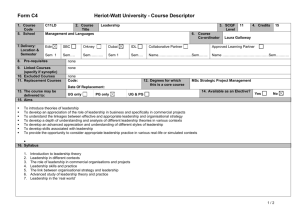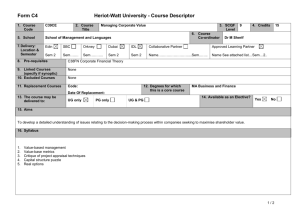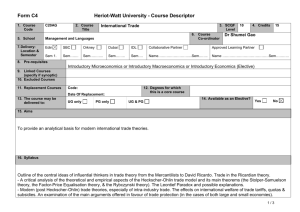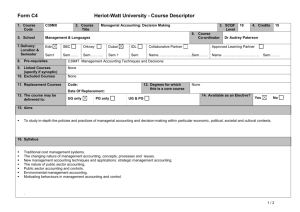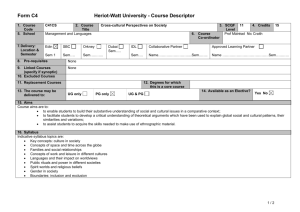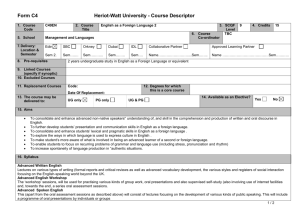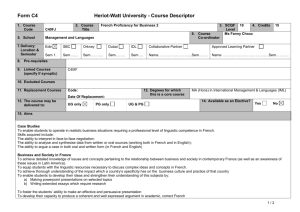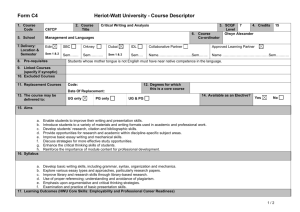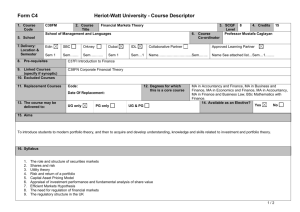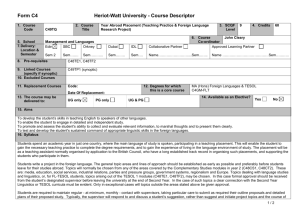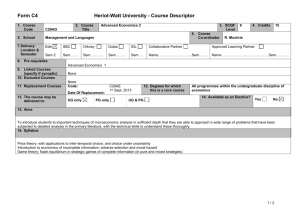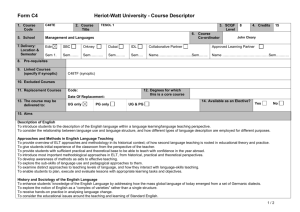C31RU_C4
advertisement
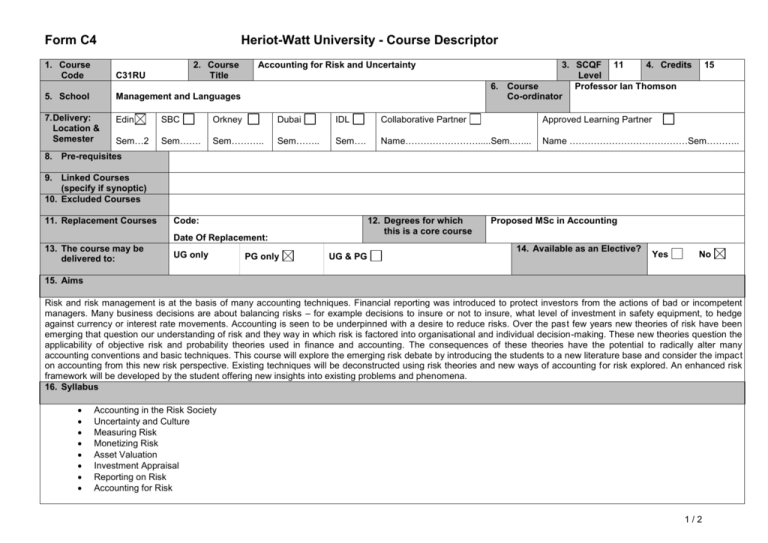
Form C4 Heriot-Watt University - Course Descriptor 1. Course Code C31RU 2. Course Title Accounting for Risk and Uncertainty 3. SCQF 11 4. Credits Level 6. Course Professor Ian Thomson Co-ordinator 15 5. School Management and Languages 7. Delivery: Location & Semester Edin SBC Orkney Dubai IDL Collaborative Partner Approved Learning Partner Sem…2 Sem……. Sem……….. Sem…….. Sem…. Name…………………….....Sem..…... Name …………………………………Sem……….. 8. Pre-requisites 9. Linked Courses (specify if synoptic) 10. Excluded Courses 11. Replacement Courses Code: 12. Degrees for which this is a core course Date Of Replacement: 13. The course may be delivered to: UG only PG only UG & PG Proposed MSc in Accounting 14. Available as an Elective? Yes No 15. Aims Risk and risk management is at the basis of many accounting techniques. Financial reporting was introduced to protect investors from the actions of bad or incompetent managers. Many business decisions are about balancing risks – for example decisions to insure or not to insure, what level of investment in safety equipment, to hedge against currency or interest rate movements. Accounting is seen to be underpinned with a desire to reduce risks. Over the past few years new theories of risk have been emerging that question our understanding of risk and they way in which risk is factored into organisational and individual decision-making. These new theories question the applicability of objective risk and probability theories used in finance and accounting. The consequences of these theories have the potential to radically alter many accounting conventions and basic techniques. This course will explore the emerging risk debate by introducing the students to a new literature base and consider the impact on accounting from this new risk perspective. Existing techniques will be deconstructed using risk theories and new ways of accounting for risk explored. An enhanced risk framework will be developed by the student offering new insights into existing problems and phenomena. 16. Syllabus Accounting in the Risk Society Uncertainty and Culture Measuring Risk Monetizing Risk Asset Valuation Investment Appraisal Reporting on Risk Accounting for Risk 1/2 Form C4 Heriot-Watt University - Course Descriptor 17. Learning Outcomes (HWU Core Skills: Employability and Professional Career Readiness) Understanding, Knowledge and Cognitive Skills Scholarship, Enquiry and Research (Research-Informed Learning) Develop a critical understanding of the new risk literature Understand the subjective nature of risk in society and business Become aware of the history and transformation of Become able to evaluate critically the effectiveness of understanding of risk accounting models and techniques from a risk perspective able to design accounting techniques that more effectively understand the possibility that risk reduction accounting manage risk than conventional techniques techniques may increase risks not reduce them Develop knowledge of emerging practices related to risk accounting Understand the different theoretical and philosophical roots of accounting for risk Industrial, Commercial & Professional Autonomy, Accountability & Working with Communication, Numeracy & ICT Practice Others this course will provide students with Students will pursue their own learning Through group working in seminars, insights that will be of value to them in by being challenged to identify their students will have the opportunity to securing employment within the own understanding of risks and how to develop presentation skills, including accountancy profession and business best manage them. the appropriate use of ICT. organisations. The critical analysis of this research Students will develop skills in jointly This course will facilitate the literature will develop students exploring complex problems development of communication skills, intellectual and professional associated with risks. including explaining, listening, competencies by analysing and questioning, presenting and defending Students will gain self-confidence in evaluating evidence, logical reasoning a position, giving feedback orally & in problem solving as they work towards and practical applications writing. designing new risk accounting practices As a course based on integrating academic research with practical problems of risk management, students will be required to develop a range of generic research skills. 18. Assessment Methods 19. Re-assessment Methods Method Duration of Exam Weighting (%) Synoptic courses? Method (if applicable) Coursework Examination 20. Date and Version Date of Proposal 2 hours 17th September 2014 Duration of Exam Diet(s) (if applicable) 30% 70% Date of Approval by School Committee Examination Date of Implementation September 2015 2 hours Version Number 2/2 1.0
